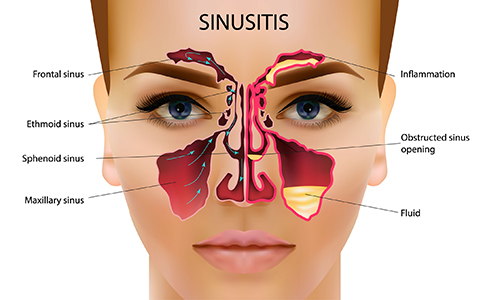Sinusitis

Understanding Sinusitis:
Sinusitis is a common condition characterized by inflammation or swelling of the sinuses, which are air-filled cavities located in the facial bones around the nose and eyes. This inflammation can block the normal flow of mucus and lead to a buildup of bacteria, viruses, or fungi in the sinuses, causing various symptoms.
Causes of Sinusitis:
Sinusitis can occur for several reasons, including:
1. Viral Infections: Common colds or influenza viruses can result in sinusitis, as they cause inflammation and swelling of the sinus tissues.
2. Bacterial Infections: Bacterial sinusitis typically develops following a viral infection when bacteria invade the sinuses, leading to persistent symptoms.
3. Allergies: Individuals with allergic rhinitis or hay fever may experience inflammation of the nasal passages, which can contribute to the development of sinusitis.
4. Structural Abnormalities: Nasal polyps, deviated septum, or other anatomical abnormalities can hinder proper sinus drainage, leading to sinusitis.
5. Immune System Disorders: Certain medical conditions, such as immunodeficiency disorders, can increase the risk of recurring sinus infections.
Symptoms of Sinusitis:
Common symptoms of sinusitis include:
1. Facial pain or pressure
2. Nasal congestion or blockage
3. Thick nasal discharge or post-nasal drip
4. Headache
5. Loss of smell or taste
6. Cough
7. Bad breath
8. Fatigue and overall discomfort
Treatment Options:
The treatment for sinusitis may vary depending on the underlying cause, duration, and severity of the condition. Dr. Seejo George offers a range of effective treatments, including:
1. Medications: Over-the-counter or prescription medications can help reduce inflammation, relieve symptoms, and clear sinus infections. These may include nasal decongestants, nasal corticosteroids, antibiotics (if bacterial infection is present), or antihistamines (for allergies).
2. Nasal Irrigation: This technique involves rinsing the nasal passages using sterile saline solution or a neti pot to flush out mucus and irritants, providing relief from congestion and promoting sinus drainage.
3. Allergy Management: If allergies contribute to sinusitis, identifying and managing allergens through allergy testing, immunotherapy, or avoidance strategies can significantly improve symptoms.
4. Balloon Sinuplasty: In cases of chronic or recurrent sinusitis, Dr. George may recommend a minimally invasive procedure called balloon sinuplasty. It involves inserting a small balloon into the blocked sinus passage and inflating it to widen the space, allowing for better drainage.
5. Endoscopic Sinus Surgery: In severe cases of sinusitis, where medications and other interventions do not provide sufficient relief, endoscopic sinus surgery may be recommended to remove blockages, correct structural abnormalities, and restore normal sinus function.
Consulting an Otolaryngologist:
If you are experiencing persistent or recurrent sinusitis symptoms, it is essential to consult with an experienced Otolaryngologist like Dr. Seejo George. With deep expertise in diagnosing and treating sinusitis, he will provide a thorough evaluation and develop a personalized treatment plan tailored to your specific needs, aiming to alleviate symptoms and enhance your overall quality of life.
Don't let sinusitis hold you back. Contact Dr. Seejo George's office today to schedule an appointment and take the first step towards effective sinusitis management.






